|
|
|
Sort Order |
|
|
|
Items / Page
|
|
|
|
|
|
|
| Srl | Item |
| 1 |
ID:
184647
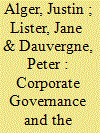

|
|
|
|
|
| Summary/Abstract |
A handful of companies dominate the world’s shipping industry. These firms have gained political leverage over the global governance of container shipping in particular. Intriguingly, in recent years the Danish conglomerate Maersk—the world’s biggest container and shipping vessel company since the mid-1990s—has been using its influence to push for higher environmental standards for the industry as a whole. To some extent these initiatives are helping to promote environmental efficiencies, cleaner fuels, and greener technology. But they are also raising costs for small and midsized companies with extremely low profit margins, further enhancing the competitiveness of the biggest shipping conglomerates in an increasingly oligopolistic market. While voluntary self-governance by companies such as Maersk is incrementally improving the environmental management of global shipping, it is also further concentrating governance power within a few transnational corporations, potentially taking more ambitious regulation off the agenda.
|
|
|
|
|
|
|
|
|
|
|
|
|
|
|
|
| 2 |
ID:
137396


|
|
|
|
|
| Summary/Abstract |
Although the need for holistic ocean governance has been widely accepted and some implementation efforts have been undertaken, there is still a significant lack of understanding or agreement as to its content, or primary objective(s). While both principled and process-based approaches have been proposed as providing objectives or content for the holistic approach, both have flaws. In this article, an approach that combines both principle and process—the ecosystem approach—is assessed and the degree to which it can provide and does already provide such content and objective(s) is explored.
|
|
|
|
|
|
|
|
|
|
|
|
|
|
|
|
| 3 |
ID:
136732
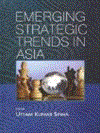

|
|
|
|
|
| Publication |
New Delhi, Pentagon Press, 2015.
|
| Description |
xvii, 289p.Hbk
|
| Standard Number |
9788182748231
|
|
|
|
|
|
|
|
|
|
|
|
Copies: C:2/I:0,R:0,Q:0
Circulation
| Accession# | Call# | Current Location | Status | Policy | Location |
| 058109 | 327.5/SIN 058109 | Main | On Shelf | General | |
| 058110 | 327.5/SIN 058110 | Main | On Shelf | General | |
|
|
|
|
| 4 |
ID:
151064


|
|
|
|
|
| Summary/Abstract |
Sitting strategically astride one of the busiest and most critical shipping lanes of the world, there is no place better than Galle in Sri Lanka, to brainstorm about the Oceans. There was a time when oceans were deemed barriers between land masses. That paradigm has shifted to view oceans as connectors of land masses. This has been made possible by maritime transportation offering economies of scale that far surpasses what is possible on continent; an edge that has only grown with passage of time.
|
|
|
|
|
|
|
|
|
|
|
|
|
|
|
|
| 5 |
ID:
160248
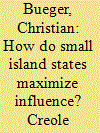

|
|
|
|
|
| Summary/Abstract |
A lack of capabilities is most often taken to imply a lack of influence. The foreign policy of the Seychelles provides a surprising case of successful small state diplomacy that counters this claim. With a population of less than 100,000 and a diplomatic service of 100 staff, Seychelles is recognized as a broker in international organizations and as an agenda setter in ocean governance. This article explores this success in four steps. First, we unpack why the current diplomatic success of Seychelles is a surprise. Second, drawing on literature on small state diplomacy, we identify three sources of small state influence: capability and location, political culture and institutional design, and political strategy. Third, we analyze recent Seychellois diplomacy in light of the four factors as well as the limitations of Creole small state diplomacy. We conclude by discussing what other small states may learn from the Seychelles.
|
|
|
|
|
|
|
|
|
|
|
|
|
|
|
|
| 6 |
ID:
098767
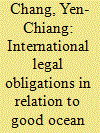

|
|
|
|
|
| Publication |
2010.
|
| Summary/Abstract |
At present, the concept of good ocean governance is articulated in the literature only. This paper adopted eight elements of good governance as an analytical framework, namely, the rule of law, participatory, transparency, consensus-based decision making, accountability, equity and inclusiveness, responsiveness and coherence. These elements are partially supported by international treaty practice but have not yet received universal acceptance.
|
|
|
|
|
|
|
|
|
|
|
|
|
|
|
|
| 7 |
ID:
083789


|
|
|
|
|
| Publication |
2008.
|
| Summary/Abstract |
The paradigmatic shift in the concept of security now puts more stress on human security related to welfare of mankind in several ways. The concept of human security is a theme on which the research in an on-going process. Various political scientists, sociologists, economists, environmentalists, security and defense experts and the like are trying to study it from different angles, all with the purpose of better conceptualizing the concept and as well for finding out the means for making it more operational on ground. Interestingly, the concept is also being studied from a perspective that tries to link it with the other contemporary themes like globalization, human rights regime, environment regime, the phenomenon of collapsed state etc. In this respect, one notices very little efforts being expended to understand the concept from an oceanic perspective, notwithstanding the fact that the issues related to human security in the terrestrial environment find their relevance in the ocean medium too. However, such indifference to the marine dimension of human security cannot remain a long lasting phenomenon as the position of 'global oceans and seas' is currently in a state of crisis with impact on food security, health security, environmental security, personal security, community security of the individuals that depend on the ocean for their livelihood and sustenance. The management of oceanic affairs is a complicated task as ocean is a medium different from that of land. However, ocean governance is crafted in a manner that is capable of meeting many challenges that the oceans face at present. From human security perspective, meeting such challenges means prosperity and wellbeing of mankind. Bangladesh as a maritime nation also faces numerous critical human security problems in its maritime zone. It is, therefore, an imperative for the country to confront such challenges in line with the contemporary ocean governance.
|
|
|
|
|
|
|
|
|
|
|
|
|
|
|
|
| 8 |
ID:
172431


|
|
|
|
|
| Summary/Abstract |
Through a normative lens, this article investigates integrated ocean management and the multiple concepts that it involves. Although international law provides legal authority to coastal states to manage their ocean area entitlements, no single legally binding norm specific to integrated ocean management exists. Nevertheless, by combining different internationally recognized sources, this article identifies and discusses two normative concepts applicable in coastal state integrated ocean management. These are (1) the framing of integrated ocean management as a management process and (2) the incorporation of environmental, economic, and social concerns into an ocean management policy.
|
|
|
|
|
|
|
|
|
|
|
|
|
|
|
|
| 9 |
ID:
110309


|
|
|
|
|
| Publication |
2012.
|
| Summary/Abstract |
Although peacekeeping operations on the ocean have never held a central position in security studies or peace and conflict studies, a small body of work has been produced on what has been called 'naval peacekeeping'. This article argues that empirical insights provided by intervention against piracy in the Horn of Africa from 2008 suggest a critical turn in the naval peacekeeping debate, from a perspective primarily concerned with identifying unconventional threats at sea and justifying new roles for navies in addressing such threats, to a new perspective concerned with a critical vision on peace and security on the oceans and a more reflexive approach to the notion of peacekeeping at sea. The naval peacekeeping debate needs to encompass such factors as the origins and connections of ocean governance to land-based structural roots, local, regional and global dynamics, as well as historical conditions underlying the problems at sea.
|
|
|
|
|
|
|
|
|
|
|
|
|
|
|
|
| 10 |
ID:
116122


|
|
|
|
|
| Publication |
2012.
|
| Summary/Abstract |
With the increasing use of the oceans and coastal areas, there is a need to pay greater attention to and reexamine the issue of ocean governance. Through comparing the framework of ocean governance in mainland China with that in Taiwan in terms of legislation, administration, and law enforcement, this article establishes that there are advanced practices concerning ocean governance in Taiwan and lessons that may be applicable for mainland China.
|
|
|
|
|
|
|
|
|
|
|
|
|
|
|
|
| 11 |
ID:
151838


|
|
|
|
|
| Summary/Abstract |
The current G7 proposal for a global ocean observing initiative is a valuable test case for the role of science in shaping diplomatic relations in the management of international spaces beyond national jurisdiction.
|
|
|
|
|
|
|
|
|
|
|
|
|
|
|
|
| 12 |
ID:
147405
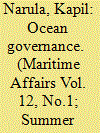

|
|
|
|
|
| Summary/Abstract |
Marine ecosystems are a rich source of biodiversity, and healthy oceans are integral to the well-being of the ecosystem. Marine biological diversity, which is unique, is, however, unprotected and is threatened by various stressors on the oceans. The paper outlines the existing ocean governance framework and analyses the gaps and limitations in addressing the conservation and sustainable use of marine biological diversity beyond areas of national jurisdiction (BBNJ). It discusses the ongoing mechanisms to address issues related to BBNJ, presents the deliberations and arguments and explores the nature of future agreement for protection of marine biological diversity in areas beyond national jurisdiction. The way ahead for strengthening of institutional arrangements to address existing ocean governance gaps is also discussed. The paper concludes that there is a need for further international cooperation and global support for ensuring conservation of BBNJ.
|
|
|
|
|
|
|
|
|
|
|
|
|
|
|
|
| 13 |
ID:
171083


|
|
|
|
|
| Summary/Abstract |
In interstate and international interaction, norm breaking is a frequent occurrence and cause of conflict. This article discusses how to deal with such behavior when it occurs in maritime space. The particularities of distinct maritime spaces and their level of regulation provide distinct opportunities. States may then take a hybrid approach by taking into account international law in more regulated areas, but seeking alternatives in less regulated ones. To discourage norm breaking and to promote cooperative approaches toward shared challenges in maritime space, stronger ocean governance that considers hybridity seems important. The article discusses these aspects in the three cases of the Arctic, the Indian Ocean, and the Mediterranean and derives first lessons for strengthened ocean governance.
|
|
|
|
|
|
|
|
|
|
|
|
|
|
|
|
| 14 |
ID:
139597


|
|
|
|
|
| Summary/Abstract |
Marine species are known to use acoustic signals for biologically critical functions such as foraging, communication, navigation, etc. The unregulated maritime activities in the Indian Ocean Region (IOR) are translating into a rapid rise in the ambient noise and consequent acoustic degradation of the marine ecosystem. The environmental conservation initiatives are seen to be in direct conflict with the economic growth imperatives and are thus faced with significant political opposition. The lack of awareness regarding the acoustic aspect of the marine ecosystem towards generating credible underwater domain awareness is a major cause of concern and limits the effectiveness of any conservation efforts. Further, the IOR with its tropical littoral waters presents suboptimal performance of the underwater sensors deployed to generate underwater domain awareness. The authors attempt to provide an alternate perspective of the acoustic degradation of the marine ecosystem as a result of heightened maritime activities in the IOR. The complexities of formulating the regulatory framework and associated monitoring mechanism are also discussed.
|
|
|
|
|
|
|
|
|
|
|
|
|
|
|
|
| 15 |
ID:
179281


|
|
|
|
|
| Summary/Abstract |
Undersea communication cables are the core critical infrastructure of the digital age. 99% of all transoceanic digital communication—financial transactions, emails, or voice messaging—is transported through undersea fiber-optic cables. The global submarine cable network is a critical infrastructure that does not receive the analytical attention it deserves. We argue that cable security is a core dimension of current and future international security governance. We present the first systematic survey of the academic discourses that investigate the politics, governance, and protection of submarine data cables. Three rather narrow literatures study the cables (1) as under threat from hybrid warfare and terrorism, or treat the cable network narrowly as a (2) technical or (3) regulatory problem. We demonstrate the need for broadening out the research agenda and addressing key questions of security governance and geopolitics of this increasingly critical infrastructure.
|
|
|
|
|
|
|
|
|
|
|
|
|
|
|
|
|
|
|
|
|